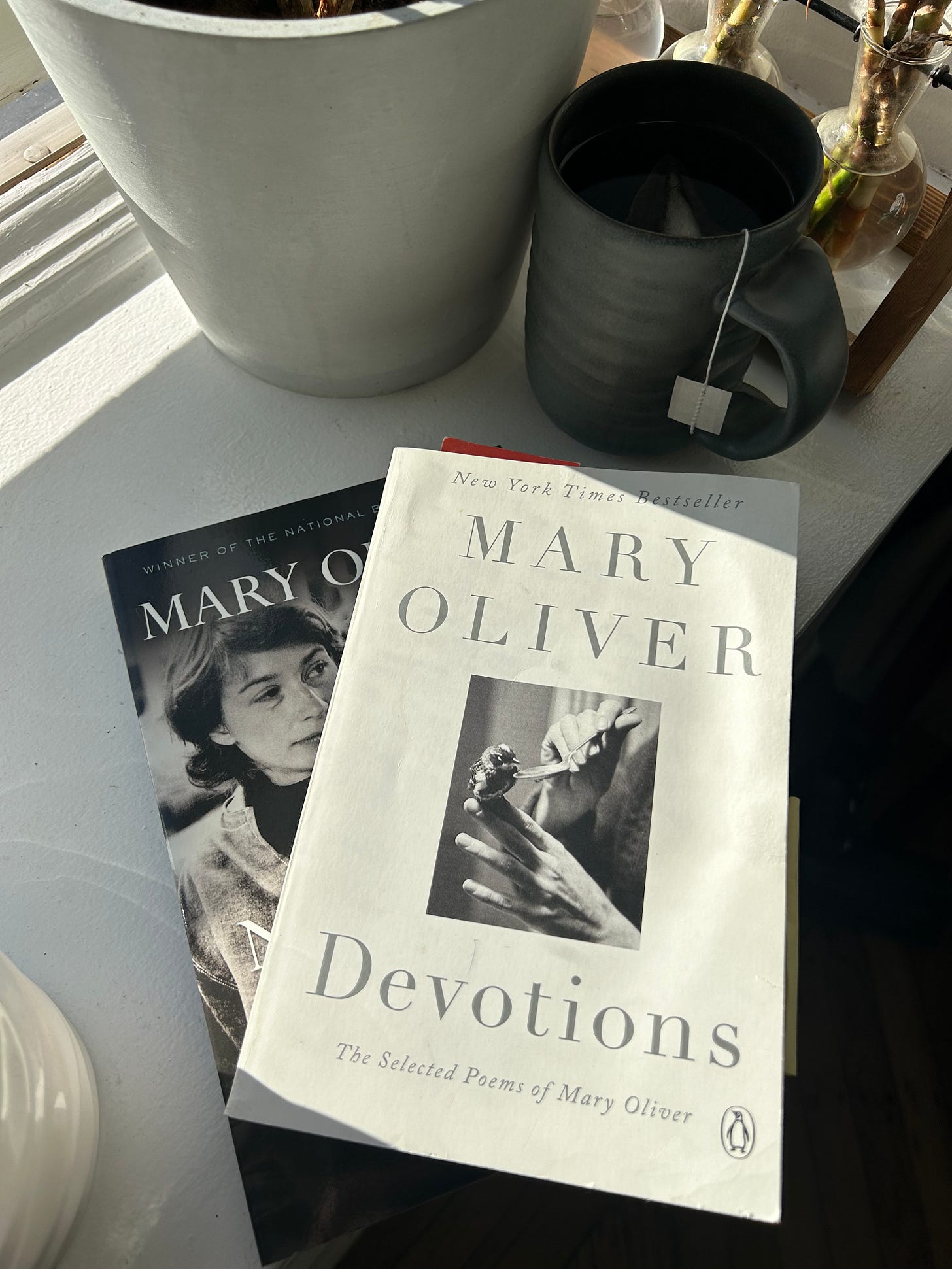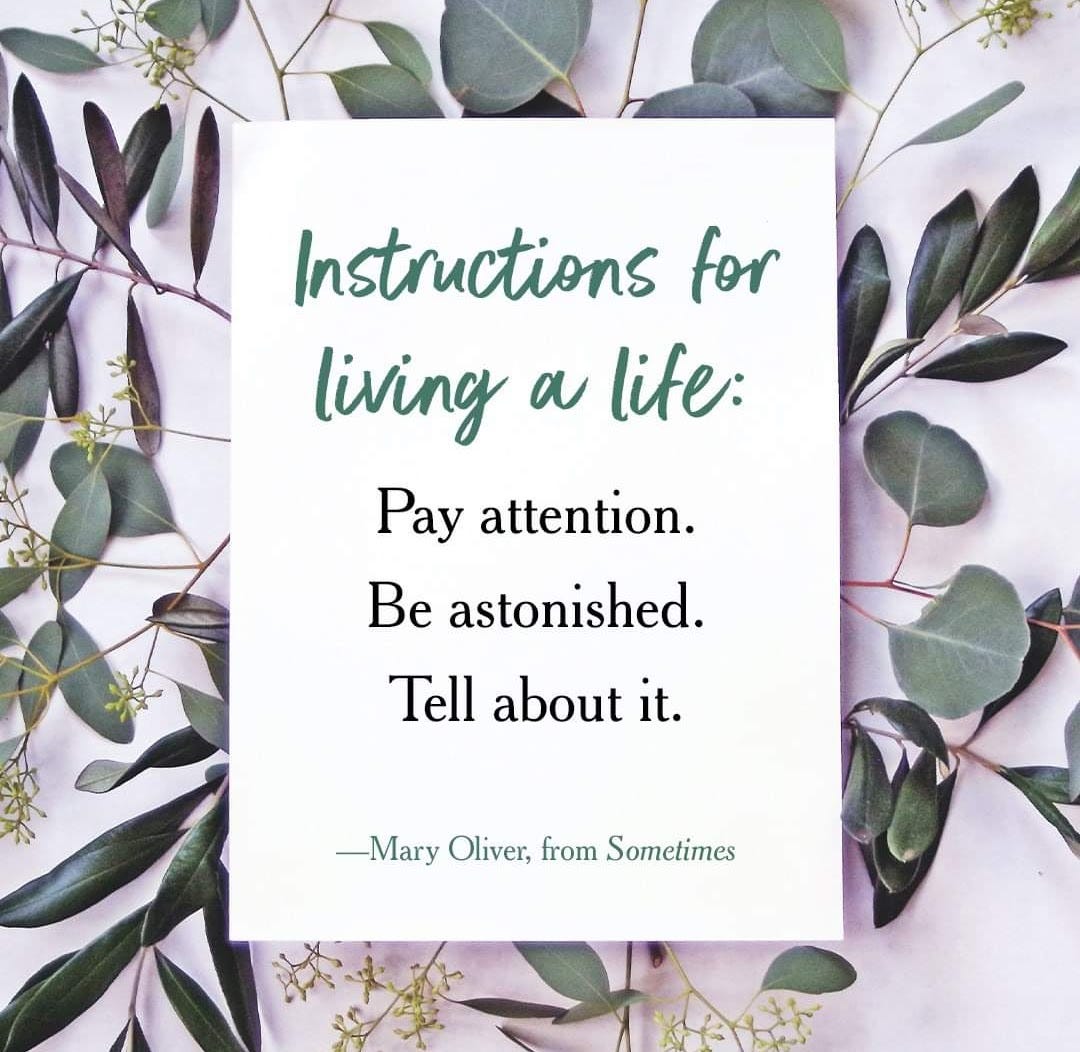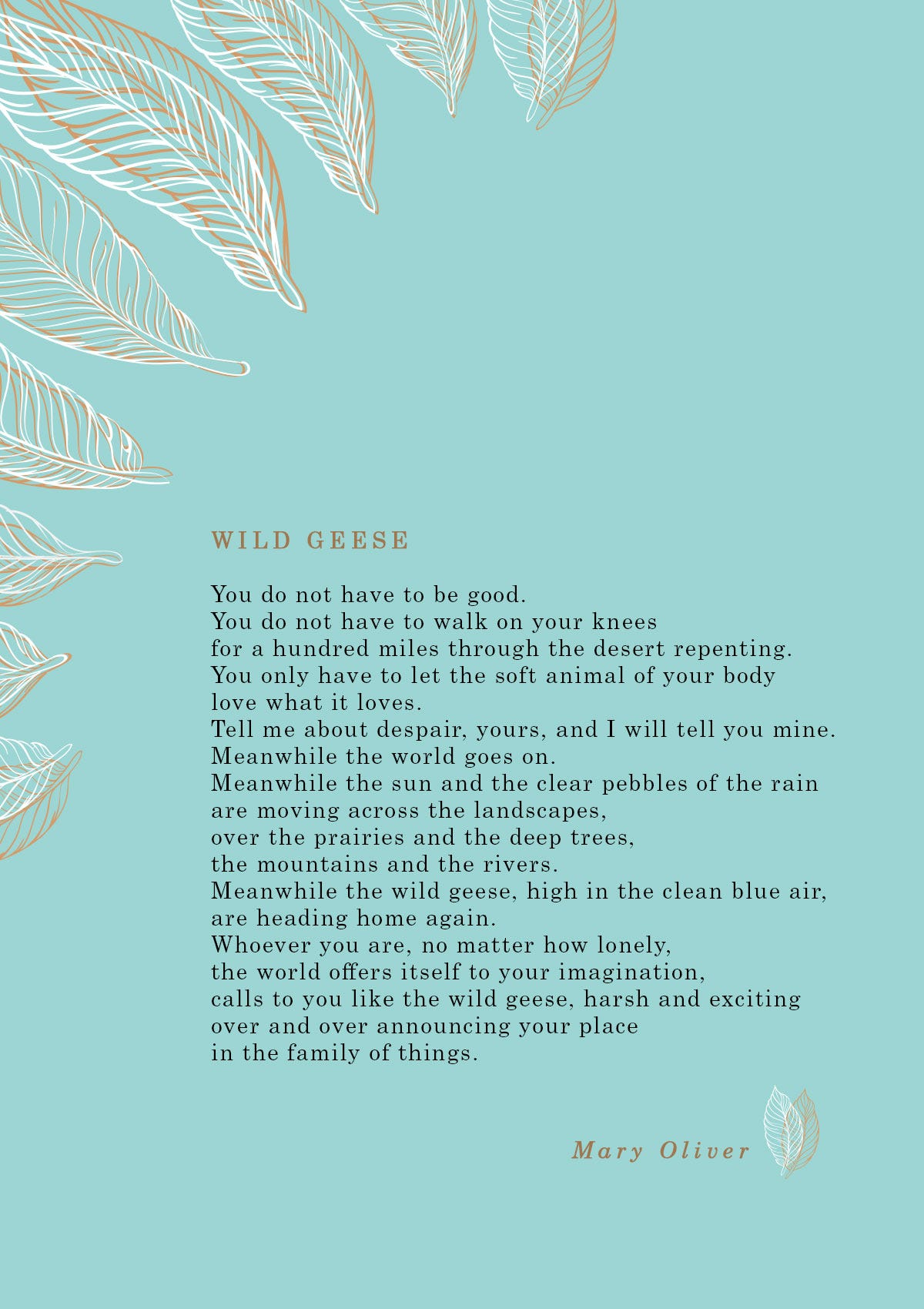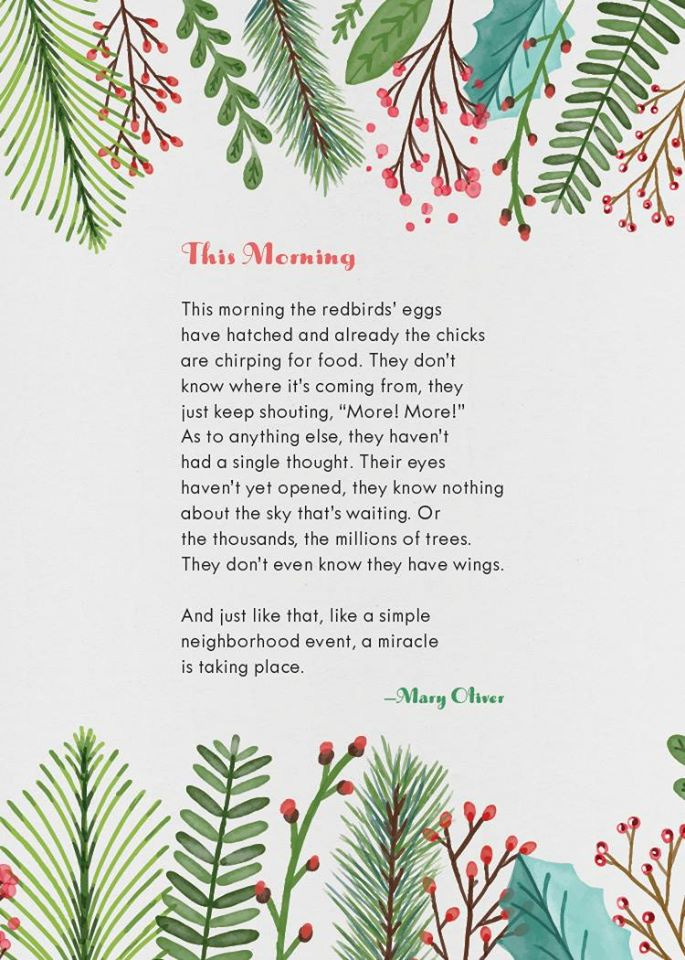Mary Oliver's Timeless Poetry: 'I Got Saved By the Beauty of the World'
My favorite poet's healing words of love and nature
Hey friends,
Mary Oliver's poetry transcends time, weaves threads of beauty and wisdom, and invites us to linger in the quiet corners of nature. She reminds us of how wind caresses our skin with its gentle touch, and how a bird’s morning song can become a celebration of life itself. One of her poetry collections usually holds a prominent place on my nightstand because, as author Krista Tippett puts it: “Amidst the harshness of life, she found redemption in the natural world and in beautiful, precise language.”
For decades, her poetry has been a timeless sanctuary, where souls find solace and hearts find resonance. From her first poetry collection in 1963 until her death in 2019, she captured the essence of life's fleeting moments, offering glimpses of deep truths hidden within the ordinary. She remains a towering figure in the literary landscape, her words a beacon guiding us back to the dance of existence. Oliver was an “indefatigable guide to the natural world,” wrote Maxine Kumin in the Women’s Review of Books, “particularly to its lesser-known aspects.”
Oliver faced a difficult childhood, so she escaped to the Ohio woods for tranquility. As a young girl, she also found a deep connection to poetry. She told Tippett:
“To this day, I don’t care for the enclosure of buildings. It was a very bad childhood — for everybody, every member of the household, not just myself, I think — and I escaped it, barely, with years of trouble. But I did find the entire world, in looking for something. But I got saved by poetry, and I got saved by the beauty of the world.
What draws me to her work again and again? I think it’s her ability to articulate admiration of the natural world succinctly, with a delicate balance of grace and strength. Being outdoors, reading her poetry, is a sacred celebration for me across all four seasons.
In honor of Oliver — a Pulitzer Prize winner known for her lifelong habit of solitary walks in the wild — I share with you some of my favorite poems. I hope they bring you as much peace, warmth, and stillness as they do for me.
Reply to me directly if any of these speak to you, or comment below. -Matthew
When I Am Among the Trees
When I am among the trees, especially the willows and the honey locust, equally the beech, the oaks and the pines, they give off such hints of gladness. I would almost say that they save me, and daily.
I am so distant from the hope of myself, in which I have goodness, and discernment, and never hurry through the world but walk slowly, and bow often.
Around me the trees stir in their leaves and call out, “Stay awhile.” The light flows from their branches.
And they call again, “It’s simple,” they say, “and you too have come into the world to do this, to go easy, to be filled with light, and to shine.”
Softest of Mornings
A Summer Day
Who made the world?
Who made the swan, and the black bear?
Who made the grasshopper?
This grasshopper, I mean-
the one who has flung herself out of the grass,
the one who is eating sugar out of my hand,
who is moving her jaws back and forth instead of up and down-
who is gazing around with her enormous and complicated eyes.
Now she lifts her pale forearms and thoroughly washes her face.
Now she snaps her wings open, and floats away.
I don’t know exactly what a prayer is.
I do know how to pay attention, how to fall down
into the grass, how to kneel down in the grass,
how to be idle and blessed, how to stroll through the fields,
which is what I have been doing all day.
Tell me, what else should I have done?
Doesn’t everything die at last, and too soon?
Tell me, what is it you plan to do
with your one wild and precious life?
Loneliness
I too have known loneliness.
I too have known what it is to feel
misunderstood,
rejected, and suddenly
not at all beautiful.
Oh, mother earth,
your comfort is great, your arms never withhold.
It has saved my life to know this.
Your rivers flowing, your roses opening in the morning.
Oh, motions of tenderness!
I Go Down To The Shore
I go down to the shore in the morning
and depending on the hour the waves
are rolling in or moving out,
and I say, oh, I am miserable,
what shall—
what should I do? And the sea says
in its lovely voice:
Excuse me, I have work to do.”
A Thousand Mornings
The sea can do craziness, it can do smooth,
it can lie down like silk breathing
or toss havoc shoreward; it can give
gifts and withhold all; it can rise, ebb, froth
like an incoming frenzy of fountains, or it can
sweet-talk entirely. As I can too,
and so, no doubt, can you, and you.
How Would You Live Then?
What if a hundred rose-breasted grosbeaks
flew in circles around your head? What if
the mockingbird came into the house with you and
became your advisor? What if
the bees filled your walls with honey and all
you needed to do was ask them and they would fill
the bowl? What if the brook slid downhill just
past your bedroom window so you could listen
to its slow prayers as you fell asleep? What if
the stars began to shout their names, or to run
this way and that way above the clouds? What if
you painted a picture of a tree, and the leaves
began to rustle, and a bird cheerfully sang
from its painted branches? What if you suddenly saw
that the silver of water was brighter than the silver
of money? What if you finally saw
that the sunflowers, turning toward the sun all day
and every day—who knows how, but they do it—were
more precious, more meaningful than gold?
Don’t Hesitate
If you suddenly and unexpectedly feel joy,
don’t hesitate. Give in to it. There are plenty
of lives and whole towns destroyed or about
to be. We are not wise, and not very often
kind. And much can never be redeemed.
Still, life has some possibility left. Perhaps this
is its way of fighting back, that sometimes
something happens better than all the riches
or power in the world. It could be anything,
but very likely you notice it in the instant
when love begins. Anyway, that’s often the
case. Anyway, whatever it is, don’t be afraid
of its plenty. Joy is not made to be a crumb.
In Blackwater Woods
Look, the trees
are turning
their own bodies
into pillarsof light,
are giving off the rich
fragrance of cinnamon
and fulfillment,the long tapers
of cattails
are bursting and floating away over
the blue shouldersof the ponds,
and every pond,
no matter what its
name is, isnameless now.
Every year
everything
I have ever learnedin my lifetime
leads back to this: the fires
and the black river of loss
whose other sideis salvation,
whose meaning
none of us will ever know.
To live in this worldyou must be able
to do three things:
to love what is mortal;
to hold itagainst your bones knowing
your own life depends on it;
and, when the time comes to let it go,
to let it go.
I Worried
I worried a lot. Will the garden grow, will the rivers
flow in the right direction, will the earth turn
as it was taught, and if not how shall
I correct it?Was I right, was I wrong, will I be forgiven,
can I do better?Will I ever be able to sing, even the sparrows
can do it and I am, well,
hopeless.Is my eyesight fading or am I just imagining it,
am I going to get rheumatism,
lockjaw, dementia?Finally I saw that worrying had come to nothing.
And I gave it up. And took my old body
and went out into the morning,
and sang.
Moments
There are moments that cry out to be fulfilled —
like telling someone you love them
or giving your money away, all of it.Your heart is beating, isn’t it?
You’re not in chains, are you?There is nothing more pathetic than caution
when headlong might save a life,
even possibly, your own.













Love Mary Oliver and I LOVE your poetic sharing of her work. Thank you for this gift, Matthew. And I will add the quote that changed my life forever and set me on the path of all that I do today: "Keep some room in your heart for the unimaginable."
Beautiful words Mary Oliver!! I was looking for inspiration to write my own words about the beauty & miracles of life waiting to be experienced by each one of us & stumbled upon your reflective words “there is nothing more pathetic then caution when headlong might save a life, even possibly yours”!! So very true ❤️